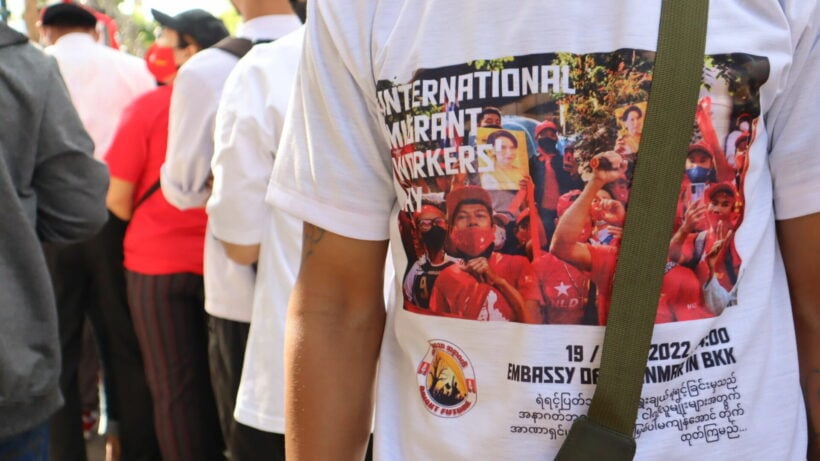Burmese workers in Bangkok protest for 600 baht minimum wage

Burmese migrants rallied in Bangkok yesterday, on International Migrants Day, to ask the government to increase the minimum wage to 600 baht per day and care about the rights of migrant workers in Thailand.
More than 100 Burmese citizens under the group name “Bright Future” gathered outside the Embassy of Myanmar near Saint Louis BTS Station at 2pm.
Burmese migrants often take on difficult, dangerous, and low-paid construction work in Thailand. The contributions of Burmese migrants to Thai society should be recognised and properly paid for, argues Bright Future.
Bright Future member Surat Keeri said most Burmese workers in Thailand earn just 100-200 baht per day…
“Burmese workers in Thailand are expected to earn 335 to 350 baht per day. You will never believe this, but some Burmese people get only 100 to 200 baht per day. Some earn 350 baht per day, but that is only a small group of people. The employers said they would cut our income off to contribute to the social security fund, but they had never sent our money there.”
“Let’s think about it. We have to pay for transportation, accommodation rent, and essentials. How can we make it with a minimum wage of 350 baht per day? We want more. It should be at least 600 to 700 baht per day.”
Alongside the wage hike, the group have four demands for the Thai government…
- Tackle corrupt employers seriously
- provide information and legal assistance to migrant workers to help them understand and defend their rights
- create a one-stop service for migrant workers to help with employment contracts
- decrease the number of documents and fees required to apply for a work permit and for a passport
The cost of living is going up for Burmese people which is exacerbated by the ruling junta of Myanmar who took power by military coup in February last year, says Surat…
“We want democracy for Myanmar, and we want the world to know that this embassy [Embassy of Myanmar in Bangkok] is not legitimate. This embassy belongs to the dictatorship. It must be removed from Thailand. We used to pay 400 to 800 baht for our passport, but it’s 7,000 to 8,000 baht right now.”
The demonstrators wore white shirts and red headbands adorned with the abbreviation NLD (the National League for Democracy), the democratic political party in Myanmar.
Protestors held up pictures of ousted democratic leader Aung San Suu Kyi and held up three-finger salutes during the protest. Bright Future also condemned the actions of Myanmar’s Chairman of the State Administration Council Min Aung Hlaing.
Surat sent this message to Thai Prime Minister Prayut Chan-o-cha…
“I know that you are a friend of Min Aung Hlaing but please don’t take sides. Don’t forget us, Burmese people, who work in Thailand, construct buildings, build up roads, and fulfil the careers that some Thai people didn’t want to do. We make Thailand beautiful. Burmese people did not burn down the Ayutthaya Kingdom but built up Bangkok! PM Prayut should be merciful and concerned about us!”
In Thailand’s history books, Burma (now Myanmar) is often depicted as an enemy of Thailand, citing the Fall of Ayutthaya in 1767 at the hands of the Burmese.
However, Burma has never been a real threat to Thailand in modern history and only started to be depicted as such around the time the Thai nation was created.
In his essay “Burma: The Enemy that Does Not Exist,” historian Nidhi Eoseewong argues that painting the Burmese as an enemy helped to build nationalism in Thailand among various populations speaking different languages who were all newly considered “Thai” under a newly-drawn modern map.
This rhetoric, deeply rooted in history, has caused the “othering” and exclusion of Burmese people and their rights in Thai society.
Latest Thailand News
Follow The Thaiger on Google News:


























